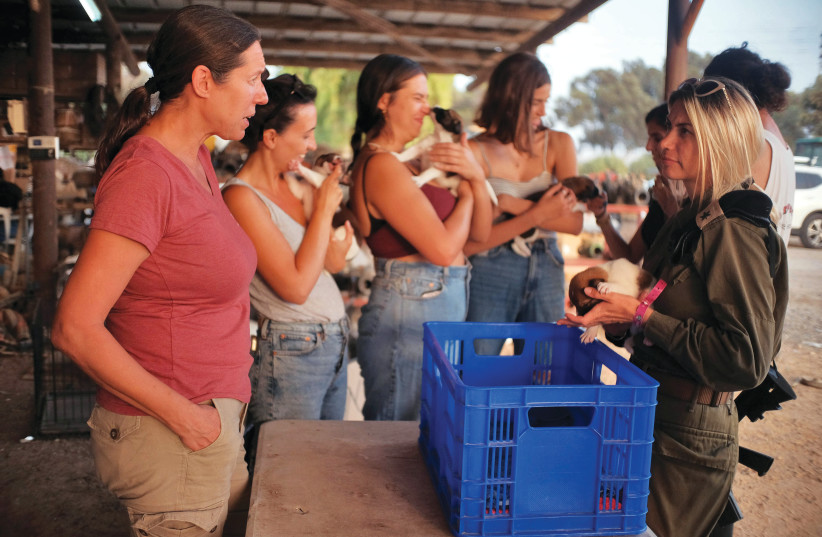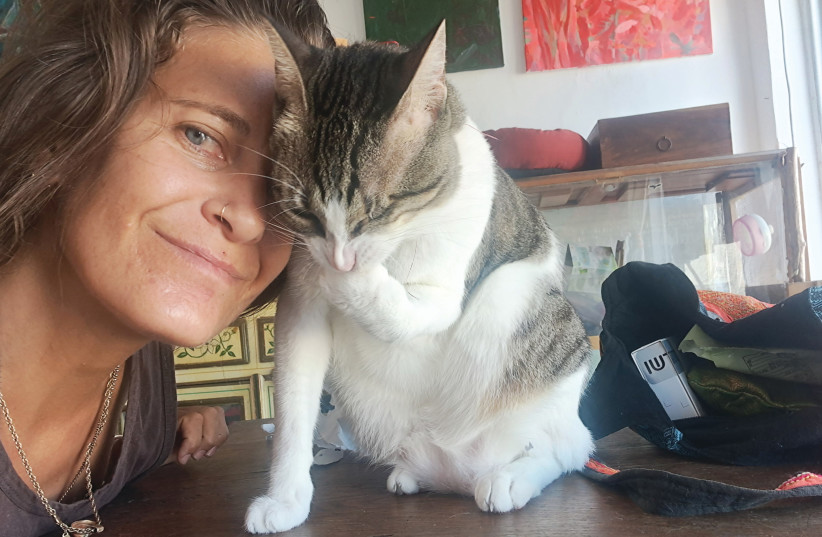Operation Swords of Iron and the tragic events of October 7 have shocked and shaken the entire country. In addition to the devastating number of casualties, many people have been left homeless or forced to evacuate their communities. The atrocities have affected animals in Israel as well.
Stories circulate of animals, large and small, being shot or having managed to escape the horrors inflicted on their families, with no one to care for them. Some families that had to evacuate their homes were unable to take their pets with them.
In light of that situation, several organizations and compassionate, dedicated people have stepped up to help the animals in need of homes, whether permanent or temporary, by attempting to locate relatives of the families, find foster homes for those requiring them, or reuniting the pets with their families who had to flee their homes.
National War Room for Dogs of War
Founded after the October 7 events, the National War Room for Dogs of War consists of NGOs Kirot Shkufim and Kelev Pagum and the civilian organization Kalbei Giborim. They banded together to provide an emergency response to dog owners and dogs from the Gaza Corridor and the South. While these organizations usually focus on a range of issues concerning animal welfare, since the start of the war their focus has been on rescuing and transporting dogs. Their aim is to reunite the dogs with their family members or other relatives; or finding them foster homes.
They also help those called up for reserve duty who have no one to look after their dogs; and they maintain a database of dogs that have gone missing in the hope of reuniting them with family members.

Contact is made through a link (noted at the end of this piece), where there are a number of options such as rescuing dogs, requesting transportation for dogs, trying to locate a missing dog, or volunteering. The War Room has a dedicated team of volunteers working around the clock to rescue and take care of as many dogs as possible, including in the North.
To date, the War Room has received approximately 200 requests to rescue animals, among them 28 urgent cases. Some 60 pets have been returned to their families, and 130 have been placed with foster families or private kennels.
Eilat Animals
Another organization helping to rescue animals from war-torn areas is Eilat Animals, set up by psychologist Daniela Ortner. The NGO, which normally deals with animals in Eilat, also has volunteers in central Israel.
Eilat Animals focuses on rescuing dogs and cats locked in homes and reuniting them with their owners, as well as driving them to reunite them with their owners who were evacuated to Eilat. They have also been purchasing and providing dog food for the fostering families, as well as the owners who were able to take their pets with them.
Cats, which are more self-sufficient and attached to places than dogs, are harder to move. Thus they are usually left in their abandoned homes, with volunteers providing them with food and water and some attention.
Ortne recounts having driven five hours to bring dogs to Eilat to reunite them with their owners. Some of the hotels housing the evacuees don’t accept pets, even though the law requires them to do so in such circumstances to prevent further trauma to the evacuees.
Therefore, Eilat Animals has also been instrumental in finding foster homes for those animals that can’t be with their owners in the hotels but enabling them to visit their pets. Approximately 30% to 40% of those evacuated have dogs. Ortne stresses that the therapeutic nature of having their pets with them provides a semblance of routine after such traumatic experiences. She says, “The pets we rescue are the bridge to hope and healing for all of us.”

Tiny Pet Rescue
Another person who has been busy caring for animals is Tel Aviv-based Danni Meyerson. She runs the Tiny Pet Rescue menagerie of 13 cats, two dogs, and street cats, while seeking carers for pets that had to be left behind.
Meyerson was in the United States visiting family when war broke out, having left her animals with a good friend. But as soon as she heard about what had happened, she rushed back to Israel to take care of her own pets and to assist people in trying to find temporary homes for their pets. Since returning, she has also been caring for cats that don’t have a home and face the trauma of sirens and rocket interceptions by providing them with food and veterinary care with the help of local veterinarians.
These are devastating and immensely difficult times for everyone in Israel; but being able to help others can often reduce the sense of helplessness and make people feel that they are making a small difference in someone’s life.
If you are able to help, whether via donating, fostering, or simply sharing, contact the National War Room for Dogs of War – Kelev Pagum at linktr.ee/helppetsisrael or on Facebook.
Eilat Animals and Tiny Pet Rescue can also be accessed via Facebook.
